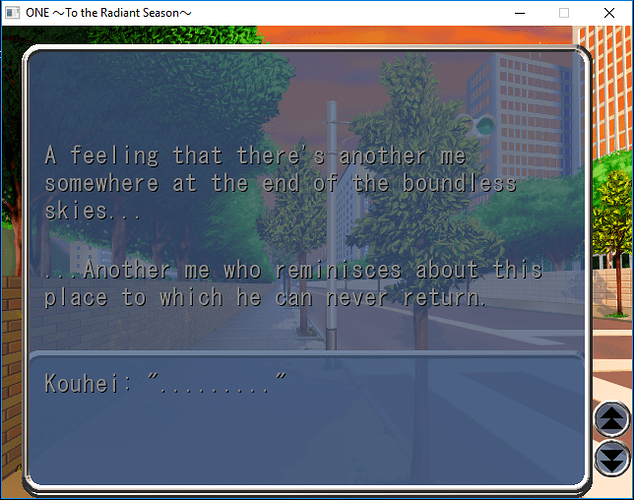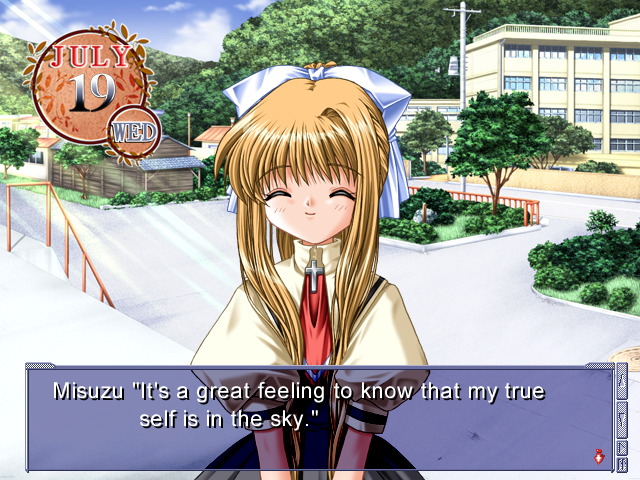So, getting back to One, and talking about Kanon, noting that this contains what could be
construed as common route spoilers, but this could all appear in a review, so it’s
probably fine to read it even if you haven’t read one or both of them. I’ll put it under a
spoiler tag anyway though.
Comparing One to Kanon, I think the easiest thing to talk about is the music.
I’m sure anyone who’s played both knows where I’m going with this already, but there are
two tracks from the different games that sound very alike. The track “The Voices of Trees
and the Bustle of Life” from Kanon sounds pretty much like a slower version of the track
“Run, Girls, Run!” from One.
I’ll get back to what this means in a minute, first we’ll talk about Sumii and Kitagawa,
the respective male classmate “homie” characters. Sumii and Kouhei seem to have known each
other a while, but Yuuichi and Kitagawa obviously meet in the story. Sumii is much more of
a “homie”, while Kitagawa is just kind of there. This, too, we’ll get back to.
Next is Nagamori and Nayuki. It’s implied in One, though you don’t see it too much, that
Kouhei spends a lot of time with Nagamori, walking home with her and the like. However, in
Kanon, Nayuki is always busy, usually with club practice. Adittionally, waking up in the
mornings, the opposite situation occurs. In One, Kouhei is unable to wake up on time, and
Nagamori is forced to suffer the consequences, and the opposite is true for Yuuichi and
Nayuki. In One, the main character is the one at fault, but in Kanon, he’s more of a
victim of circumstance. In One, it’s the main character that determines the fact that the
two can’t hang out properly in the morning, but in Kanon, there’s nothing Yuuichi could do
about it even if he wanted to.
Finally, is snow. Despite both being set in a freezing cold winter environment, it doesn’t
snow in One, unlike Kanon. More rain, less snow.
These are all very indicitive of the difference in atmosphere between the two games which
have very similar settings. A music track with less energy, a more distant friend, an
inability to spend time with people, a cold permanace rather than a short battering. In
this way, I’m actually one of few who doesn’t mind Kitagawa’s character. It fits better
with Kanon’s themes than Sumii would. Kanon is intentionally cold, and lonely, and sad.
As for One, there are much fewer underlying themes throughout the whole game, and this is
expressed very explicitly in Kouhei’s erratic behavior.
Just thought I’d write about how the difference in the two bgm tracks really drives home
the incredible difference in atmosphere between, as I said, “the two games which
have very similar settings.”
Might come back to this later and see if I can tie it in with the other games, maybe compare all the school-based Key VN’s in this manner, but we’ll see.



